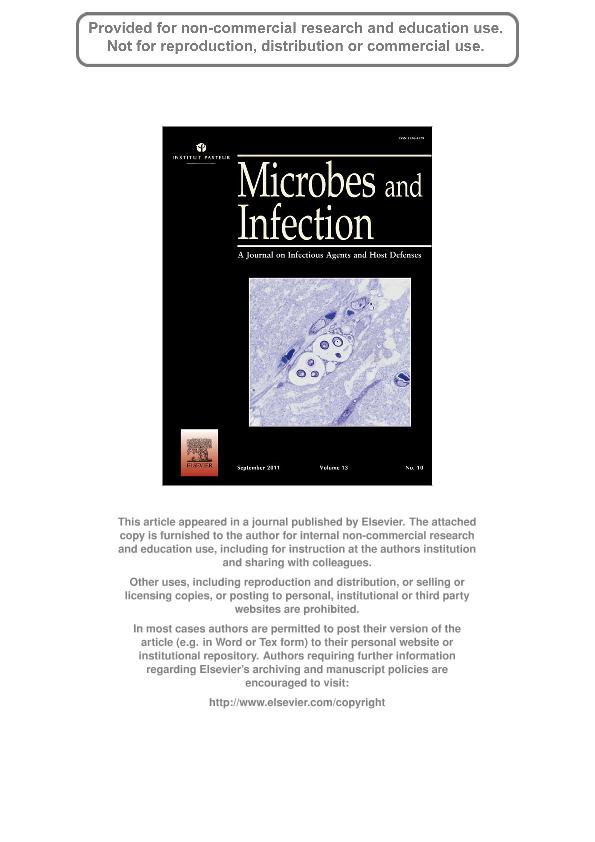Artículo
Proinflammatory response of human endothelial cells to Brucella infection
Ferrero, Mariana Cristina ; Bregante, Julieta; Delpino, María Victoria
; Bregante, Julieta; Delpino, María Victoria ; Barrionuevo, Paula
; Barrionuevo, Paula ; Fossati, Carlos Alberto
; Fossati, Carlos Alberto ; Giambartolomei, Guillermo Hernan
; Giambartolomei, Guillermo Hernan ; Baldi, Pablo Cesar
; Baldi, Pablo Cesar
 ; Bregante, Julieta; Delpino, María Victoria
; Bregante, Julieta; Delpino, María Victoria ; Barrionuevo, Paula
; Barrionuevo, Paula ; Fossati, Carlos Alberto
; Fossati, Carlos Alberto ; Giambartolomei, Guillermo Hernan
; Giambartolomei, Guillermo Hernan ; Baldi, Pablo Cesar
; Baldi, Pablo Cesar
Fecha de publicación:
09/2011
Editorial:
Elsevier Science
Revista:
Microbes and Infection
ISSN:
1286-4579
Idioma:
Inglés
Tipo de recurso:
Artículo publicado
Clasificación temática:
Resumen
Although vascular pathologies such as vasculitis, endocarditis and mycotic aneurysms have been described in brucellosis patients, the interaction of Brucella with the endothelium has not been characterized. In this study we show that Brucella abortus and Brucella suis can infect and replicate in primary human umbilical vein endothelial cells (HUVEC) and in the microvascular endothelial cell line HMEC-1. Infection led to an increased production of IL-8, MCP-1 and IL-6 in HUVEC and HMEC-1 cells, and an increased expression of adhesion molecules (CD54 in both cells, CD106 and CD62E in HUVEC). Experiments with purified antigens from the bacterial outer membrane revealed that lipoproteins (Omp19) but not lipopolysaccharide mediate these proinflammatory responses. Infection of polarized HMEC-1 cells resulted in an increased capacity of these cells to promote the transmigration of neutrophils from the apical to the basolateral side of the monolayer, and the same phenomenon was observed when the cells were stimulated with live bacteria from the basolateral side. Overall, these results suggest that Brucella spp. can infect and survive within endothelial cells, and can induce a proinflammatory response that might be involved in the vascular manifestations of brucellosis.
Archivos asociados
Licencia
Identificadores
Colecciones
Articulos(IDEHU)
Articulos de INST.DE EST.DE LA INMUNIDAD HUMORAL PROF.R.A.MARGNI
Articulos de INST.DE EST.DE LA INMUNIDAD HUMORAL PROF.R.A.MARGNI
Articulos(INIGEM)
Articulos de INSTITUTO DE INMUNOLOGIA, GENETICA Y METABOLISMO
Articulos de INSTITUTO DE INMUNOLOGIA, GENETICA Y METABOLISMO
Citación
Ferrero, Mariana Cristina; Bregante, Julieta; Delpino, María Victoria; Barrionuevo, Paula; Fossati, Carlos Alberto; et al.; Proinflammatory response of human endothelial cells to Brucella infection; Elsevier Science; Microbes and Infection; 13; 10; 9-2011; 852-861
Compartir
Altmétricas



